Sustainable gardening is more than just a trend; it is a necessary approach to gardening that respects the environment while fostering plant growth and biodiversity. As more people become aware of the environmental impacts of conventional gardening practices, sustainable gardening is emerging as a popular alternative. This guide provides an introduction to eco-friendly practices for beginners, focusing on how to cultivate a garden that supports environmental health and contributes to a sustainable future.
Understanding Sustainable Gardening
At its core, sustainable gardening aims to reduce the negative impact on the environment while promoting healthy plant growth. This approach incorporates practices that conserve resources, protect ecosystems, and enhance soil health. Unlike conventional gardening, which often relies on chemical fertilizers, pesticides, and excessive water usage, sustainable gardening emphasizes natural methods and materials.
Key Principles of Sustainable Gardening
- Soil Health: Healthy soil is the foundation of a thriving garden. Sustainable gardening starts with nurturing the soil by incorporating compost, organic matter, and cover crops. Compost improves soil fertility and structure, while organic matter provides essential nutrients for plants. Cover crops, such as clover or rye, help prevent soil erosion and enhance soil fertility through nitrogen fixation.
- Water Conservation: Efficient water use is critical in sustainable gardening. Methods such as drip irrigation, rainwater harvesting, and mulching help conserve water and reduce waste. Drip irrigation delivers water directly to the plant roots, minimizing evaporation and runoff. Collecting rainwater in barrels provides a free, eco-friendly source of water for the garden. Mulching helps retain soil moisture, suppress weeds, and regulate soil temperature.
- Plant Selection: Choosing the right plants is crucial for a sustainable garden. Native plants, adapted to the local climate and soil conditions, typically require less water and fertilizer than non-native species. They also provide habitat and food for local wildlife, including pollinators like bees and butterflies. Additionally, selecting plants with similar water and sunlight needs ensures more efficient use of resources.
- Pest Management: Sustainable pest management focuses on preventing and controlling pests using natural methods. Integrated Pest Management (IPM) combines biological, physical, and cultural controls to manage pests effectively. Encouraging beneficial insects, such as ladybugs and lacewings, can help control harmful pests. Physical barriers, like row covers, and natural repellents, such as garlic or neem oil, are also effective in managing garden pests without resorting to synthetic chemicals.
- Biodiversity: Promoting biodiversity in the garden supports a healthy ecosystem. A diverse garden with a variety of plants, including flowers, herbs, and vegetables, attracts beneficial insects, birds, and other wildlife. Biodiversity helps create a balanced ecosystem where natural predators can keep pest populations in check and plants can benefit from improved pollination.
Practical Tips for Getting Started
- Start Small: If you’re new to sustainable gardening, begin with a small garden plot or even container gardening. Starting small allows you to experiment with different techniques and understand what works best in your specific environment.
- Use Organic Practices: Opt for organic seeds and plants to avoid exposure to synthetic chemicals. Organic gardening practices, such as using compost and natural fertilizers, help build soil health and promote plant growth without harming the environment.
- Reduce, Reuse, Recycle: Incorporate the principles of reducing, reusing, and recycling into your gardening practices. Use recycled materials for garden structures, such as trellises or raised beds, and repurpose household items like old containers for planting. Reducing waste and reusing materials helps lower your ecological footprint.
- Educate Yourself: Stay informed about sustainable gardening practices by reading books, attending workshops, and connecting with local gardening groups. Learning from experienced gardeners and experts can provide valuable insights and tips for creating a successful sustainable garden.
- Embrace Permaculture: Permaculture is a design philosophy that seeks to create sustainable and self-sufficient systems by mimicking natural ecosystems. Incorporating permaculture principles, such as creating food forests or integrating animal husbandry, can enhance the sustainability of your garden and provide additional benefits, such as increased food production and natural pest control.
- Monitor and Adapt: Regularly monitor your garden to assess its health and productivity. Be prepared to adapt your practices based on changing conditions, such as shifts in weather patterns or pest populations. Flexibility and observation are key to maintaining a successful sustainable garden.
Benefits of Sustainable Gardening
- Environmental Impact: Sustainable gardening practices help reduce pollution, conserve water, and minimize waste. By avoiding chemical pesticides and fertilizers, you protect local waterways and wildlife from harmful substances. Water conservation methods reduce the strain on local water resources, and composting reduces the amount of organic waste sent to landfills.
- Personal Health: Growing your own fruits, vegetables, and herbs provides access to fresh, chemical-free produce. Sustainable gardening also promotes physical activity and mental well-being through outdoor work and connection with nature. Gardening can be a therapeutic activity that reduces stress and improves overall quality of life.
- Community Engagement: Sustainable gardening often fosters a sense of community and connection with others who share similar values. Participating in community gardening projects, sharing produce with neighbors, and engaging in local environmental initiatives can strengthen community bonds and promote collective action for a sustainable future.
Conclusion
Sustainable gardening is a rewarding and impactful way to contribute to environmental conservation while enjoying the benefits of a flourishing garden. By focusing on soil health, water conservation, plant selection, pest management, and biodiversity, you can create a garden that supports both ecological balance and personal well-being. Starting small, embracing organic practices, and staying informed are key steps for beginners in sustainable gardening. As you embark on this journey, you’ll not only cultivate a beautiful garden but also play a vital role in promoting a healthier planet for future generations.
